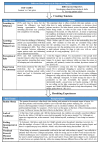From Learner to Provider: Navigating Role Tensions in Postgraduate Medical Training Through Activity Theory
- PMID: 39957724
- PMCID: PMC11827561
- DOI: 10.5334/pme.1499
From Learner to Provider: Navigating Role Tensions in Postgraduate Medical Training Through Activity Theory
Abstract
Introduction: The transition from medical school to residency, especially during the postgraduate year (PGY) internship, poses unique challenges as graduates navigate clinical practice complexities. Understanding PGYs' experiences is crucial for developing effective support strategies to promote their professional growth and well-being.
Methods: This qualitative, longitudinal study followed ten PGYs from August 2021 to July 2023, using biannual audio diary based on open-ended questions to capture their experiences. Data analysis, guided by Activity Theory, focused on role conflicts and contradictions as PGYs transitioned from learners to practicing physicians.
Results: The analysis revealed prevalent role conflicts and contradictions, primarily due to the tension between the PGYs' roles as learner and healthcare provider. Differences in objectives between PGYs and practicing doctors further exacerbated these conflicts, leading to clashes in priorities and care approaches. Consequently, PGYs experienced reality shock, lack of confidence, and feelings of incompetence, compounded by heavy workloads and exhaustion. These findings underscored the need for support and resources to help PGYs navigate these challenges and succeed in their healthcare roles.
Discussions: Using Activity Theory to analyze the inherent challenges and contradictions within the PGY experience, this study offers insights for enhancing PGY preparedness, fostering both professional development and well-being. Drawing on recommendations supported by existing literature, which are stratified by tools, rules, and division of labor, we propose targeted strategies to address specific facets of the PGY role, thereby improving the overall training environment. This research highlights the need for tailored interventions to support PGYs through the challenging transition into clinical practice.
Copyright: © 2025 The Author(s).
Conflict of interest statement
The authors have no competing interests to declare.
Figures
References
MeSH terms
LinkOut - more resources
Full Text Sources



